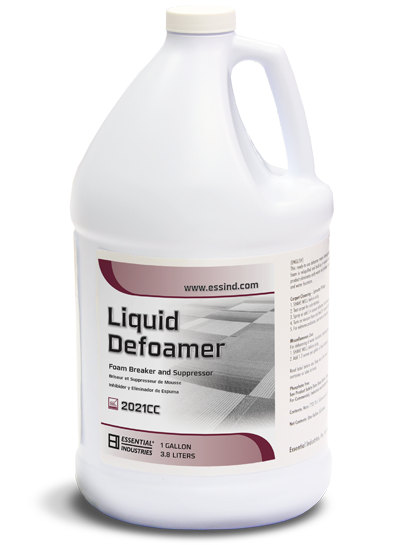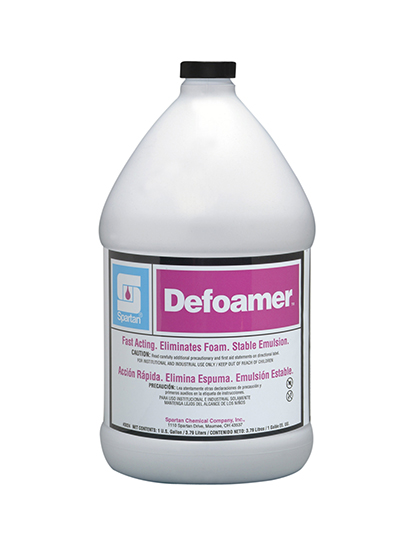The Most Recent Developments in Chemical Defoamer Formulation for Enhanced Efficiency
The Most Recent Developments in Chemical Defoamer Formulation for Enhanced Efficiency
Blog Article
Discover the Leading Reasons You Need a Chemical Defoamer for Effective Foam Control
Chemical defoamers offer as vital agents that mitigate foam development, consequently improving processes in fields such as food production, drugs, and wastewater therapy. As we discover the diverse advantages of chemical defoamers, it becomes obvious that their function prolongs beyond plain foam decrease, affecting total productivity in methods that may not be right away apparent.
Boosted Operational Effectiveness
Exactly how can the effective use chemical defoamers dramatically improve operational efficiency in various commercial processes? The presence of foam can impede manufacturing by obstructing tools, lowering capability, and complicating procedure control. Chemical defoamers serve as a critical remedy in mitigating these obstacles. By decreasing surface stress, they facilitate the rapid collapse of foam, enabling smoother procedure and reducing downtime (Chemical Defoamer).
In sectors such as food and beverage, drugs, and wastewater treatment, the application of defoamers boosts process security and item quality. For circumstances, in fermentation processes, regulating foam generation is vital for maximizing return and effectiveness. Additionally, the use of defoamers can bring about much more reliable blending and aeration, causing enhanced response times and overall efficiency.
Moreover, when foam is efficiently regulated, it minimizes the threat of overflow and contamination, guaranteeing conformity with safety and security and quality requirements. This not only simplifies operations but likewise permits for far better resource use. Ultimately, the integration of chemical defoamers into commercial procedures cultivates a more reliable operations, optimizing output while maintaining premium criteria. Hence, their function in improving functional effectiveness can not be overemphasized.
Cost Financial Savings and Source Monitoring

In addition, the usage of defoamers enhances the efficiency of raw material usage. In lots of applications, too much foam can trigger overuse of chemicals, leading to unnecessary expenses. By managing foam levels, companies can enhance their chemical input, thereby lowering operational costs. This not only contributes to monetary savings however additionally advertises lasting techniques by lowering waste.
Furthermore, decreased foam in processing systems can enhance the total throughput, allowing centers to increase production capacity without sustaining extra expenses - Chemical Defoamer. This effective source administration translates right into considerable economic advantages, making it possible for businesses to assign funds towards innovation or development. In recap, the combination of chemical defoamers right into industrial procedures promotes a much more resource-efficient and affordable environment, ultimately supporting organizational growth and sustainability
Improved Item High Quality

Making use of chemical defoamers plays an important duty in improving item quality across numerous sectors. Extreme foam can lead to irregular product formulas, impacting the final features of products such as paints, finishings, food, and drugs. By alleviating foam formation, chemical defoamers assist in smoother manufacturing my website procedures, making certain that formulations stay consistent and meet specific top quality requirements.
In the food and drink industry, for example, the existence of foam can influence the quality and taste of products, inevitably affecting customer contentment. Chemical defoamers assist keep the desired appearance and look, therefore improving the total top quality of the last item. Similarly, in the production of layers and paints, foam can result in issues such as pinholes and inadequate adhesion, threatening the item's efficiency.
Furthermore, the usage of defoamers can boost the performance of procedures like fermentation and emulsification, which are essential for accomplishing desired item characteristics. look at here now By simplifying manufacturing and ensuring constant high quality, chemical defoamers not only boost completion product but likewise add to a positive brand name credibility. Thus, purchasing effective foam control services is important for any type of company intending to provide premium products consistently.
Devices Protection and Long Life
Minimizing foam production is necessary for securing devices and guaranteeing its durability in different commercial applications. Too much foam can bring about a variety of operational issues, including tools damages, boosted maintenance expenses, and unintended downtime. When foam collects, it can cause overflow, causing spills that compromise the stability of machinery and surrounding areas.
In addition, foam can block pumps and sensors, which can prevent performance and performance. In severe cases, it can result in the break down of elements, necessitating costly repair services or substitutes. By using a chemical defoamer, companies can effectively minimize foam development, thus safeguarding their equipment from the destructive effects of foam-related problems.
In addition to protecting against damage, efficient foam control can dramatically improve the functional lifespan of machinery. Spending in a top quality chemical defoamer is a proactive method for protecting tools and fostering durability in commercial setups.
Versatility Across Industries
Chemical defoamers play an important duty in numerous industries, efficiently attending to foam-related obstacles throughout diverse applications. Their convenience is noticeable in sectors such as food and beverage, pharmaceuticals, and wastewater therapy, where foam can reduce and impede processes efficiency. In the food sector, defoamers ensure smooth production by preventing foam formation this contact form during mixing, fermentation, and bottling, thus preserving item high quality and uniformity.

In addition, in wastewater treatment centers, chemical defoamers are employed to control foam throughout the oygenation process, advertising optimum microbial activity and boosting the general treatment performance. Their capacity to function effectively in high-temperature and high-shear settings even more emphasizes their adaptability.
Final Thought
In conclusion, the usage of chemical defoamers is critical for reliable foam control throughout numerous sectors. The convenience of defoamers permits for prevalent application in food manufacturing, drugs, and wastewater treatment, ultimately contributing to lasting development and the upkeep of high operational requirements (Chemical Defoamer).
Chemical defoamers serve as important agents that mitigate foam development, therefore boosting procedures in markets such as food production, pharmaceuticals, and wastewater therapy. As we discover the diverse advantages of chemical defoamers, it becomes noticeable that their duty expands beyond mere foam decrease, influencing general productivity in ways that may not be immediately noticeable.
By alleviating foam formation, chemical defoamers facilitate smoother manufacturing processes, making sure that formulas remain consistent and satisfy specified top quality requirements.
By utilizing a chemical defoamer, firms can effectively mitigate foam development, thus guarding their devices from the detrimental effects of foam-related concerns.
In conclusion, the utilization of chemical defoamers is necessary for efficient foam control throughout various markets.
Report this page